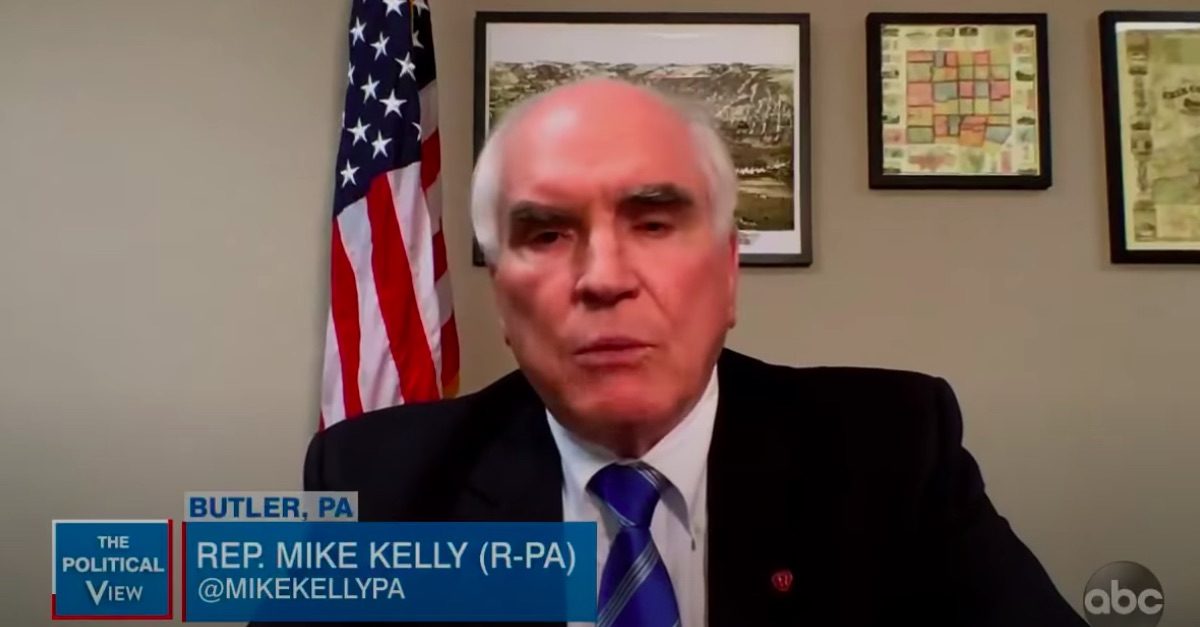
Pennsylvania House Rep. Mike Kelly
A coalition of Republican politicians and attorneys who have worked in Republican federal administrations asked the U.S. Supreme Court on Monday to reject Pennsylvania Rep. Mike Kelly’s challenge to the commonwealth’s election results, arguing that the Pennsylvania Supreme Court correctly applied the applicable law in dismissing the case.
Kelly’s lawsuit alleged that Pennsylvania Gov. Tom Wolf and Secretary of the Commonwealth Kathy Boockvar, both of whom are Democrats, violated the commonwealth’s constitution by allowing universal mail-in voting to occur for the 2020 election pursuant to a state law which Kelly and the other plaintiffs claim conflicts with, and therefore violates, the state constitution. The commonwealth’s high court was blunt and brief in last week’s three-page takedown of Kelly’s complaint, refusing to “invalidate the ballots of the millions of Pennsylvania voters who utilized the mail-in voting procedures established by Act 77 and count only those ballots that Petitioners deem to be ‘legal votes.’”
The GOP amici filed a brief arguing that the U.S. Supreme Court should not interfere with the decision of the Pennsylvania Supreme Court, which held that Kelly’s lawsuit was barred by the doctrine of laches. That doctrine states generally that the persons bringing a claim simply waited too long to bring it and that the delay resulted in unreasonable prejudice to those on the other side.
The group also implored the justices not to endorse the “standard of direct review” in the court’s concurrent opinions from 2000’s Bush v. Gore decision, asserting the Pennsylvania’s legislature was constitutionally authorized to statutorily delegate the state supreme court as the final arbiter of its federal election results.
“Applicants cite the Bush v. Gore concurrence as authority for this Court to override the Pennsylvania Supreme Court’s interpretation of Pennsylvania law on laches. That is nonsense,” the brief stated. “Nothing in the Elections Clause or the Electors Clause limits the normal power of a state’s supreme court to interpret state law and decide any remedies thereunder. State courts exercised the power to interpret state law before the adoption of the federal Constitution. And for 210 years thereafter, no federal court challenged the authority of a state supreme court as the final arbiter of state election laws.”
Among the Republican politicians in the amici group were former Senator John Danforth, former New Jersey Gov. Christine Todd Whitman, former Senator and Governor Lowell Weicker, and several who have worked in Republican administrations such as Carter Phillips and Stuart Gerson.
According to the brief, many of the post-election lawsuits that were filed in federal court were done based on an intentional misreading of the Bush v. Gore concurrence in an effort to “bypass an issued, pending, or available state supreme court decision based on the proposition that the Elections Clause and the Electors Clause somehow federalized the interpretation of state election laws.”
The amici warned Alito that catering to Kelly’s argument could lead to wins for Democrats in the future.
Thus, misuse of the Bush v. Gore concurrence has led to federal court litigation in a state where the lead is approximately 300 times as large as the 537-vote margin – 0.009% – in Florida in 2000. In 2020, the federal court plaintiffs and Applicants are Republicans. If a majority of this Court encourages their approach, in future elections, the Democrats would surely follow suit. Like Gresham’s law, the bad would drive out the good.
Also on Monday, more than 30 current members of the Pennsylvania General Assembly submitted an amicus brief to the court urging the justices to take up Kelly’s lawsuit. The brief argued that while the Pennsylvania Supreme Court dismissed the complaint under the doctrine of laches, it failed to take into account “changes” to the Election Code brought on by the court’s ruling in September. That ruling stated that mail-in ballots received up to three days after Election Day were presumed to be timely mailed unless there was evidence it was mailed after Nov. 3.
“The orders and acts of the Supreme Court of Pennsylvania and the Department of State of Pennsylvania contravened, frustrated and substantially modified the express provisions of the Pennsylvania Election Code, as recently amended by the General Assembly. Such orders and acts were made in the days and weeks leading up to, and immediately after, Election Day, thereby affording the Petitioners in this case little opportunity to raise their claim prior to Election Day,” the brief stated. “Rather than ‘sitting on their rights’ as inferred by the Pennsylvania Supreme Court, the Petitioners acted reasonably expeditiously in raising their claim. In addition, had the Petitioners raised their claim prior to Election Day they would have certainly faced a challenge of standing as their claim of harm would likely have been deemed speculative.”
The lawmakers asked the court to provide a resolution to the claims that will “resolve concerns regarding the results of the most recent elections and avoid future claims that may continue to plague elections in Pennsylvania.”
Read the brief opposing Kelly below:
Pa Scotus Amicus Brief by Law&Crime on Scribd
[image via ABC News screengrab]